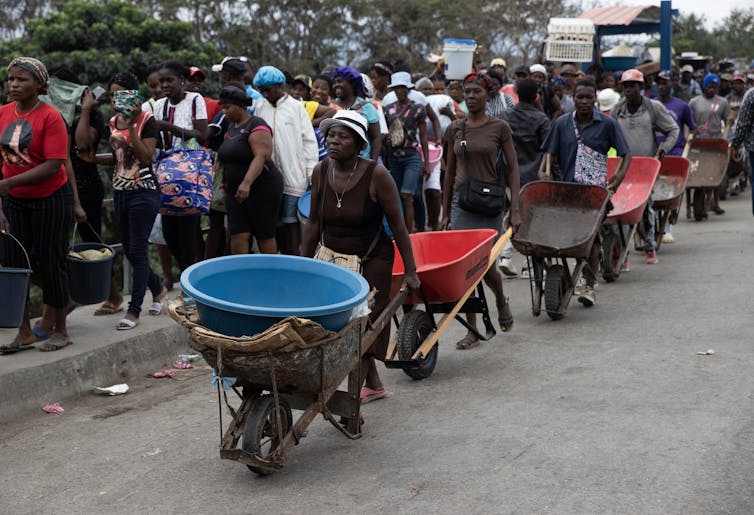- The armed gangs of Haiti have a very clear assessment of their power as movers and shakers of the country’s future
The poorest nation in the western hemisphere, Haiti, finds itself in a catastrophic situation. For close to a month now, the country has been lurching from one crisis to another. The underwriters of the anarchy are armed gangs.
Among their achievements are the removal of a sitting government, a near total takeover of the capital, Port-au-Prince, orchestrating a grinding humanitarian crisis, and generally stirring up mayhem across the country.
At the same time, however, Haiti’s freefall into an abyss can only be prevented if the gangs are put in the driver’s seat of governance.
For generations, Haiti’s gangs have received power, patronage and privileges from the country’s political establishment, the opposition and businesses. Militia gangs were formalised as power brokers under the leadership of the country’s former dictator, François “Papa Doc” Duvalier, in the late 1950s.
Although disbanded in the late 1980s, their legacies live on. The 200 or so marauding gangs that are currently terrorising Haitians can be traced back to the dreaded Tonton Macoute, a paramilitary and secret police force that Papa Doc implanted in the country’s political culture.
The de-facto head of a consortium of gangs that have brought Port-au-Prince to a standstill, Jimmy “Barbecue” Chérizier, has proposed that he (and the gangs he represents) would consider laying down weapons if armed groups were allowed to take part in talks to establish a new government.
In an interview with Sky News, he said: “If the international community comes with a detailed plan where we can sit together and talk, but they do not impose on us what we should decide, I think that the weapons could be lowered.”
The gangs’ demand that they be given a frontline role in Haiti’s future political landscape is not audacious. It is borne out of an astute reading of the realities on the ground.
Gangs are a permanent fixture in the country’s socioeconomic and political processes, and getting rid of them under the current circumstances is wishful thinking. Perhaps it is time the international community acknowledged this fact and devised a plan that can realistically address Haiti’s problems.

Spoilers
The reason why many peace plans fail is due to the fact that they often refuse a place at the negotiating table to the groups that perpetrated the conflict in the first place.
The logic behind this is simple. It is considered unethical to give voice to the very elements responsible for past ills. And most peace plans consider the voice of the “moderators” as legitimate and not that of the “extremists”.
But such exclusive peace plans gives birth to another set of challenges. Those who are pushed out of negotiations and power-sharing arrangements become “spoilers”.
Spoilers are leaders who hold the view that any change in status quo undermines their interests. Nervous for their future, they set out to undermine any plan that seeks to establish normalcy in the society.
Savimbi’s spoiler war
The Angolan civil war (which began in 1975) went on for years even after the signing of a peace agreement in 1991. The key architect of the civil war, Jonas Savimbi, had begun fighting for independence in the 1960s when Angola was still a colony of Portugal.
But Savimbi, billed as an anti-communist during the height of the cold war, was actually no more than a power-hungry opportunist. The rebel leader refused to accept the outcome of UN-monitored elections in 1992 in which his party Unita lost both power and influence, and embraced the role of a spoiler by choosing war over peace.
Between 1992 and 2002, he initiated a pointless and personal guerrilla war against the elected government. Hundreds of thousands of peasants were killed, wounded, displaced or starved to death.
Whatever the nature, character and past of the adversaries may be, any credible peace plan must incorporate provisions to accommodate the spoilers in order to have a fighting chance of success. Sponsors of any peace plan, external or homegrown, need to be vigilant and sensitive to the management of spoilers.
Lessons for Haiti
Haiti’s collapse into anarchy has exacted a terrible human price. But there is no hiding the fact that gangs will remain the architects of Haiti’s future, no matter the colour and shape of the future government. There are three critical arenas where gang cooperation is indispensable.
First, an international peacekeeping force cannot be deployed to restore order without gang cooperation. The alternative to that would be body bags as the external force confronts hardened criminals well-versed in urban warfare. Chérizier has made no secret that plans for an international peacekeeping force led by Kenya in Port-au-Prince will lead to more violence, whoever is in charge.
Second, Haiti currently does not have a political elite capable of shouldering the responsibilities of an interim government. Thus, anyone harbouring political ambitions will require the support of the gangs to establish legitimacy. It is in this context that the active participation of gangs over tacit co-option in the political process is vital to ensure stability.
Third, in a country of non-existent or broken institutions, ironically it is the gangs who have a semblance of a command structure capable of getting things moving – be it water supply, the transport of goods, or the reopening of neighbourhoods. Whether you like it or not, it is the gangs who hold the key to Haiti’s future stability.
The armed gangs of Haiti have a very clear assessment of their power as movers and shakers of the country’s future. These demands should not be ignored. The alternative, as Chérizier has eloquently predicted, is “an escalation of violence” in a ruined polity with a terrified population already on its knees.
The above, written by Amalendu Misra (Professor of International Politics, Lancaster University), was first published in The Conversation

